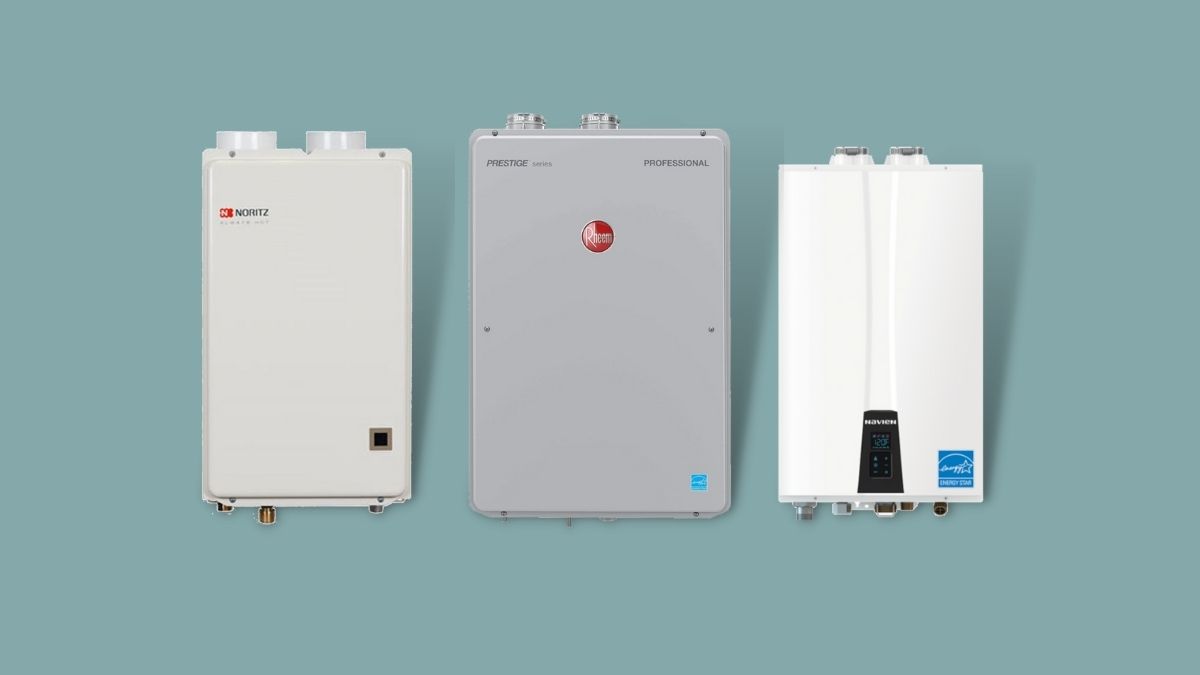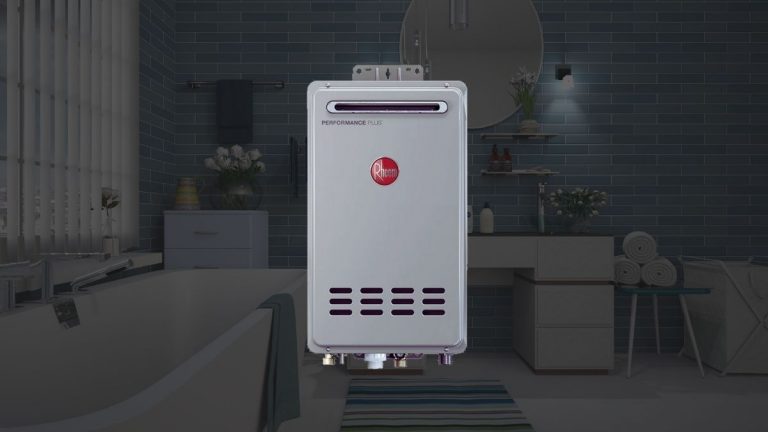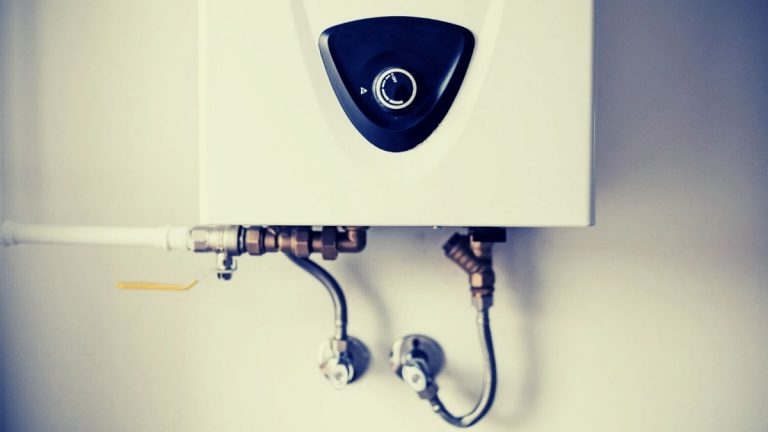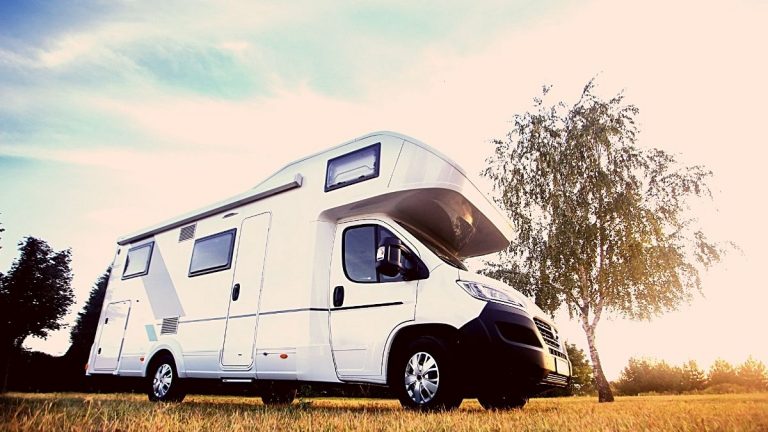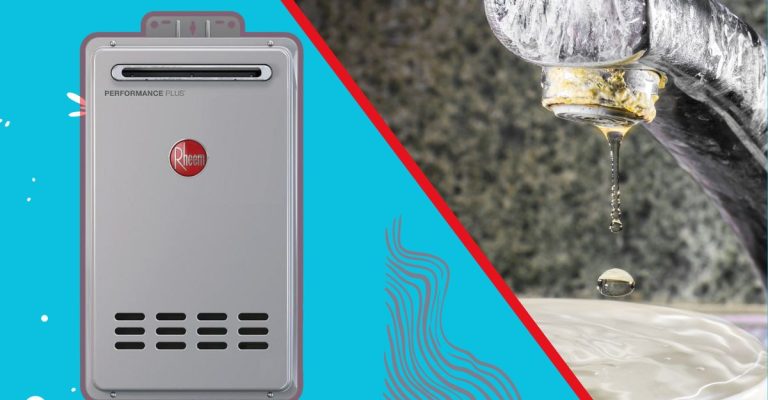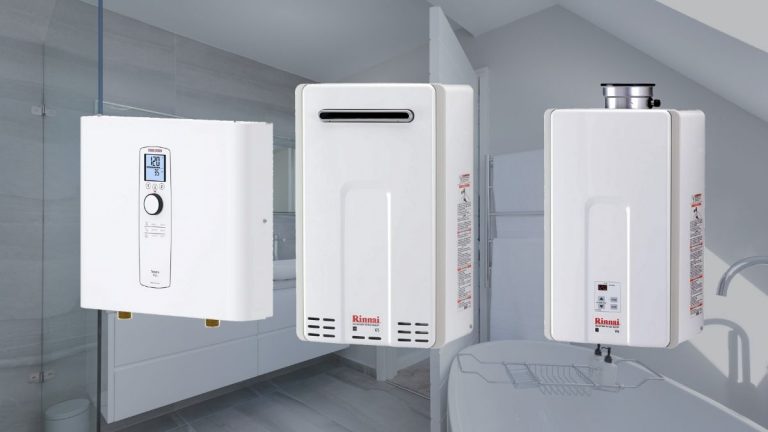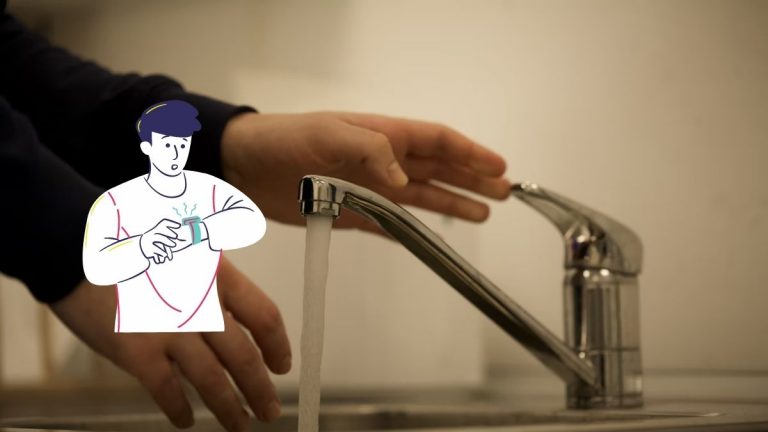5 Best Condensing Tankless Water Heaters 2022 & Buying Guide
Looking for a tankless gas water heater that is as efficient as an electric? Then you need the best condensing tankless water heater.
Non condensing, standard tankless gas water heaters are at most 80% efficient, which means you lose 20 cents on every dollar of gas spent. Condensing tankless water heaters, on the other hand, are more than 90% or sometimes 99% efficient. Meaning more savings on the gas bills. Sure, condensing units are expensive but they require cheaper PVC pipes for venting and setup, thus costing you overall the same.
With that set-aside, it’s time we talk about our top 5 handpicked condensing tankless water heaters. I have searched the whole market to find out these top 5 models which are the best out there right now.
REVIEW: The 5 best condensing tankless water heaters
1.Rinnai RU199iN natural gas condensing tankless water heater for large family
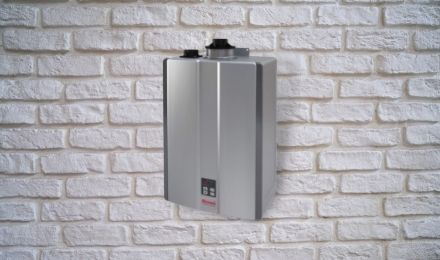
- Fuel: Natural gas
- Max flow: 11 GPM
- BTU: 199,000
- Dimension: 18.5×11.4×31.3
- Efficiency: 0.92 UEF
Rinnai RU199iN is one of the most powerful condensing tankless water for large families. With upto 11 GPM flow rate in warm climates, it can provide hot water to upto 7 outlets at the same time. So if you have a big family of 7-10 people or a home with 3-4 bathrooms where multiple showers are taken simultaneously then Rinnai is best for you. But be aware that if you live in a colder climate the flow rate will drop.
The natural gas-fired unit consumes 199k BTUs per hour and has an amazing energy efficiency of 0.92 UEF or a universal energy factor. So more hot water and less energy bill every month!
Apart from that, the Rinnai unit has a stylish stainless steel design that’s compact and gives an aesthetically please feel. The unit has to be installed inside and as with any condensing tankless water heater, you can use scheduled 40 PVC pipes for venting.
The unit comes with upto 10 years warranty on the heat exchanger. There are some add-on features that I would like to talk about like recirculating tech that reduces delivery time and wifi controlled access. Both of these features need to be paid extra for. Beware cause the company description is misleading.
2.Rheem Prestige RTGH-95DVLN condensing tankless water heater
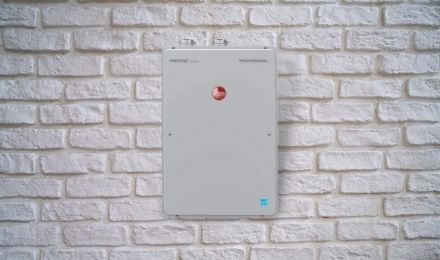
- Fuel: Natural gas
- Activation flow: 0.26 GPM
- Max flow: 9.5 GPM
- BTU: 199,900
- Dimension: 27.6X9.76×28.5
- Energy factor: 0.93 UEF
Rheem prestige series condensing tankless water heater is another good solution for your whole house water heating needs. The natural gas-fired unit burns 199,900 BTUs per hour and has a universal energy efficiency factor of 0.93. It is an energy star-certified model so you can rest assured that you will be saving money on energy bills every month.
It has a complete stainless steel build that gives it robustness. Rheem prestige has a very low activation flow rate of just 0.26 GPM and can deliver hot water at a rate of upto 9.5 GPM, the second-highest on the list. It is perfect if you live in cold climates and looking for a whole-house solution. You can run multiple showers and washers without worrying about a drop in flow rate.
Rheem condensing unit is equipped with smart self-diagnostic technology which promptly alerts you whenever a service to the unit is required. The unit should be installed indoors only. As a condensing unit, the Rheem has a low carbon footprint.
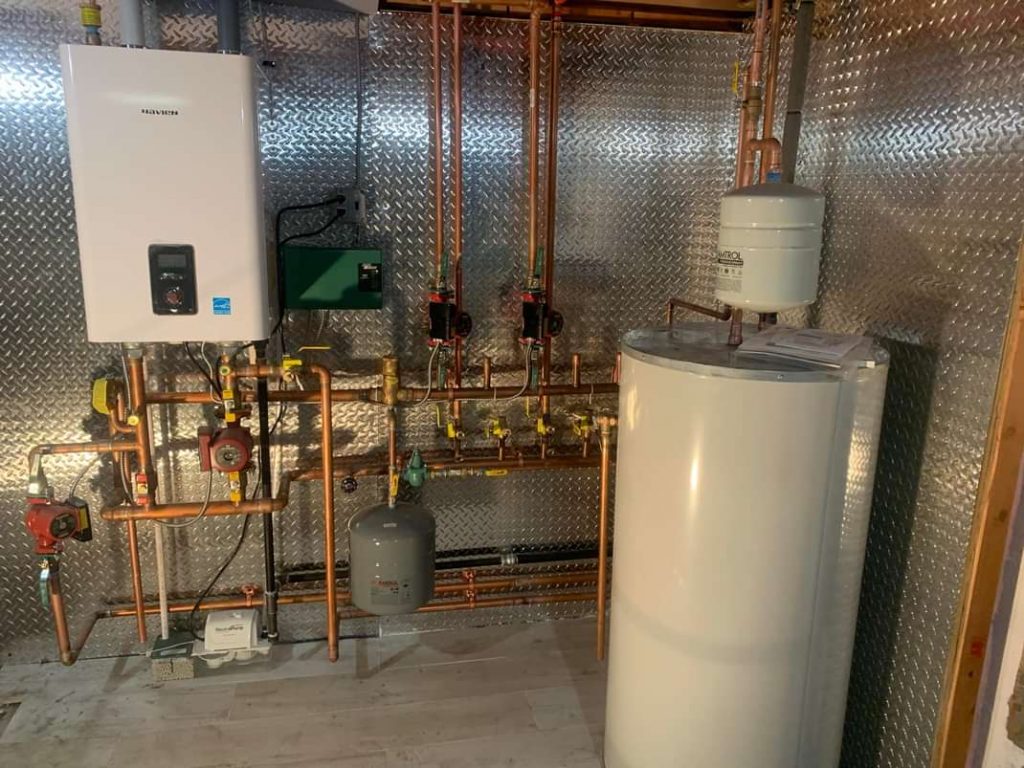
- Fuel: Natural gas/propane
- BTU: 199,900
- Activation flow: 0.5 GPM
- Max flow 11 GPM
- Energy efficiency: 0.96 UEF
- Dimension: 17.3×27.4×13.2
Navien is a South Korean water heater manufacturer known for making quality and reliable boilers. The NPE 240-A is companies one of the most popular condensing tankless units.
Available in both natural gas, and propane fuel types, the unit has a very high energy efficiency of over 0.96 UEF. It’s perhaps the most efficient on the list and is also EnergyStar certified.
The energy consumption of this model is 199,900 BTU per hour Max. It costs $191 on the average annual energy bill, according to the manufacturer.
Navien NPE model offers upto 11 GPM of high hot water flow and close to 5 GPM in freezing cold climates. The tankless water heater has an average activation rate of 0.5 GPM.
Speaking of the build quality and carbon footprint, the Navien has a complete stainless steel construction that gives it a longer lifespan and has low NOx output.
4. Takagi TH3J-OS-N outdoor condensing tankless water heater

- Fuel: Natural gas
- Max flow: 6.6 GPM
- BTU: 160,000
- Energy efficiency: 0.96 UEF
- Dimension: 11.2×17.7×24.8
If you are looking for a condensing tankless water heater that can be easily installed outside of your home and requires no special venting then Takagi TH3J might be the one for you. It’s designed to be installed outdoor and comes with surge and freeze protection.
The 160k BTU condensing unit can deliver hot water at upto a 6.6 GPM rate and enough in freezing temperatures to supply hot water to a shower and a sink. As with any outdoor heaters, the unit comes with remote control for temperature access and diagnostic alerts.
The energy-efficient system is EnergyStar certified and has a 0.96 UEF rating. Meaning maximum savings. The unit has been proven to be emitting the minimum NOx output possible so you can rest assured that you don’t have a heavy bad impact on the environment.
One of the big issues with Takagi however is noise. It’s not as silent as it should be.
5. Noritz NRC66 indoor condensing tankless water heater
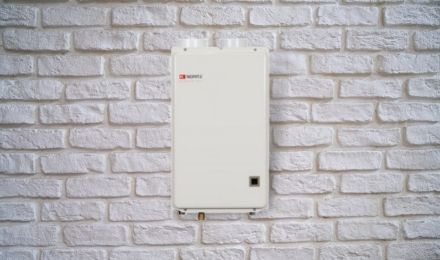
- Fuel: Natural gas
- Activation flow: 0.5 GPM
- Max flow: 6.6 GPM
- BTU: 120,000
- Energy efficiency: 0.89 UEF
- Dimension: 6.7×13.8×23.6
The NRC66 series indoor condensing tankless water heater from Noritz is the last one to make up our list. You can call it the smallest unit on this list. The EnergyStar certified unit can deliver hot water at upto 6.6 GPM in warm climates of Florida. It has a fair 0.5 GPM activation flow rate.
Noritz consumes 120,000 BTUs of fuel per hour and is not impressively efficient. You can judge for yourself it’s 0.89 UEF.
The unit is available in both natural gas and propane variant.
Noritz NRC66 has a decent build quality and that’s probably why the maker is giving upto 12 years of warranty assurance on the heat exchanger.
What to look for when shopping for condensing tankless water heater

Flow rate
Flow rate is the maximum hot water flow, in GPM, which a tankless unit can deliver. You will want to determine how many hot water fixtures you can use at the same time and add up the flow rates of these fixtures. The resulting number is the max flow rate you should look for in your water heater. Say, for example, your family uses a shower with 1.5 GPM flow and a kitchen sink at 1GPM at the same time. Then,
1.5+1 = 2.5 GPM
This 2.5GPM is the maximum flow rate you need. Learn more about sizing tankless water heaters here.
Fuel type
Condensing tankless water heaters come in two fuel forms; natural gas and propane. You will want to compare the price and availability of fuel in your locality before deciding and also the efficiency of heaters varies based on the fuel it operates on. So take everything into account before deciding.
Efficiency
Of course, the whole aim of going for condensing water heater is energy efficiency and money-saving. So make sure you go for EnergyStar certified model and with the highest energy factor or universal energy factor ratings.
Should I buy condensing or non-condensing tankless water heater?
Condensing tankless water heaters are more expensive but require cheaper PVC pipes for venting and are at least 90+% energy efficient.
Non-condensing tankless water heaters, on the other hand, are cheaper but require expensive steel venting pipes and are less than 80% energy efficient.
So if you are looking for long-term savings then you should definitely go for condensing tankless water heater. Otherwise, a non-condensing tankless water heater costs less upfront.
Condensing water heater vs non-condensing
Condensing water heaters are expensive but more energy-efficient at more than 90%. Non-condensing water heaters are cheaper but less energy-efficient at less than 80%. Learn more about condensing vs non-condensing water heaters here.
Are condensing water heaters worth it?
Yes, although condensing water heaters are expensive, they reduce your overall monthly energy bill. Condensing water heaters are more than 90% which is at least 10% more efficient than the non-condensing counterparts. So you can expect savings on energy at least 10% per month.

